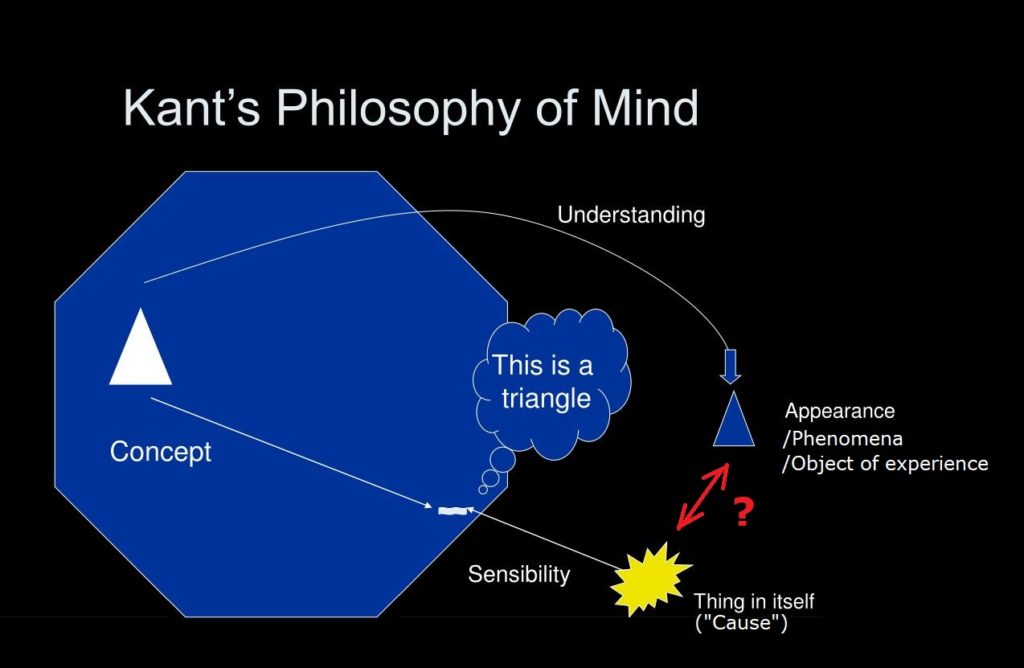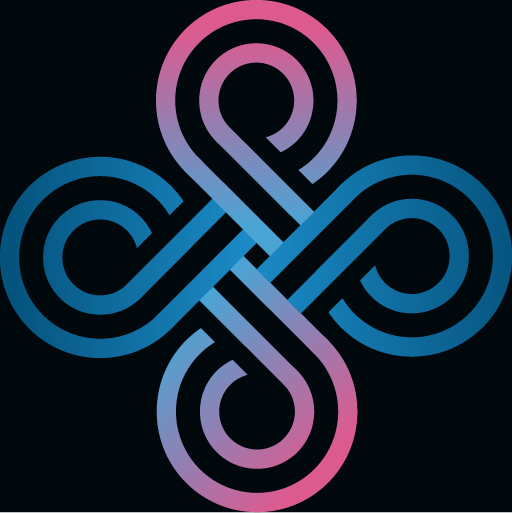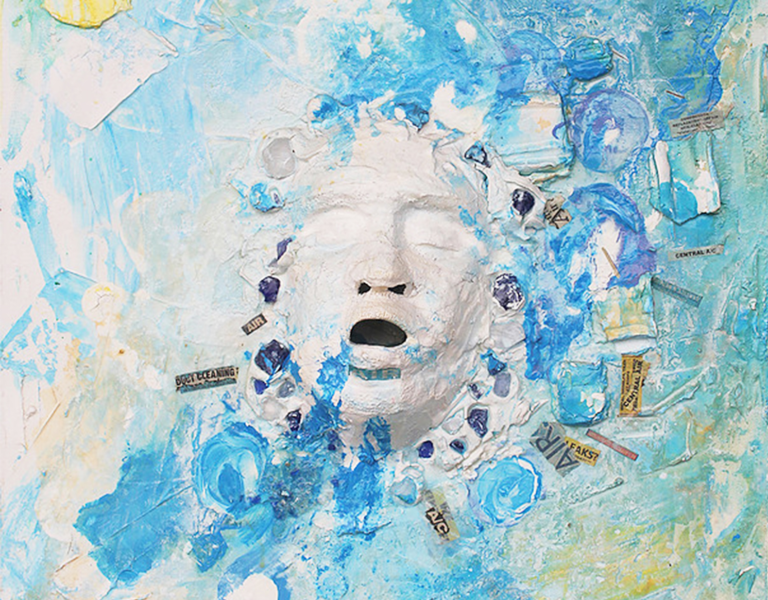The Invited Philosopher
Nadine
This is the second virtual dinner/lunch. Nadine had dinner in Duesseldorf, Germany, while I had lunch in Miami, Florida, USA.
2 Menus
- Nadine’s dinner: Chickpeas, portobello mushrooms, paprika in a pumpkin curry coconut milk sauce, with turmeric rice
- Paty’s lunch: Sofrito of mixed vegetables, grilled portobello mushrooms with wild rice
- Nadine’s Wine: Rose wine
- Nadine’s dessert: German Oblaten-Lebkuchen
- Paty’s dessert: Papaya and dark chocolate
*Art: Courtesy of https://www.gallerynadine.com
The Philosophy
Immanuel Kant’s Transcendental Idealism is well explained in this Youtube video. Kant argued that our minds process the information received from the world, and out of that a concept of objects arises, that may or may not be what is out there. Those objects are constructed by the mind but because the world is giving us the information, we construct only that which our mind can construct. And if we know the structure of the mind, we can know something about the objects we will see, that is what is called “a priori knowledge”, we know something of the objects before we experience them, before we understand our experiences as humans. This is related to the statement in this YouTube video by Anil Seth: So perception – figuring out what’s out there – has to be a process of informed guesswork in which the brain combines the sensory signals with it’s a priori expectation or beliefs about the way the world is.
The Summary
Kant’s philosophical approach to knowledge goes beyond direct sensory evidence and requires an understanding of the mind’s innate modes (a priori knowledge) of processing that sensory evidence. Kant’s doctrine restricts the scope of our cognition to appearances that our sensibility receives, i.e. the faculty by which humans intuit objects. He denies that we can reason and understand things as they are in themselves, “thing-in-itself”, i.e. understand things as they are independently of how we experience them through reason.
Analysis
The Theory
In this particular instance we need to offer some background on philosophical theories that are related to Kant’s theory and that make it easier to understand his philosophy.

Kant argued that it is not possible to know anything that is beyond experience, such as questions about god, or the soul, whether mortal or immortal. Beyond experience is the essence of things, or what he calls the “thing-in-itself”.
This stands in contrast to Aristotle, a realist, who argued that what we see is what we get, the object of experience is equal to the thing-in-itself. This also stands in contrast to Descartes, a rationalist, and Locke, an empiricist, who argued there is a relationship between the object of experience and the thing-in-itself and it can be studied even if they are not equal. This also stands in contrast to Barkley, an idealist, who argues to get rid of the thing-in-itself. According to the idealist philosophy, familiar objects like tables and chairs are ideas perceived by the mind and, as a result, cannot exist without being perceived.
In his refutation of idealism, Kant argues he cannot know anything about the thing-in-itself and cannot even say if it exists or if it has an effect but it cannot be removed from being considered until there is a way to prove or disprove it.
Related Theories
Rationalism (Avicenna, Descartes, Leibniz): a theory “in which the criterion of truth is not sensory but intellectual and deductive”, knowledge is obtained through reasoning.
Idealists (Barkley, Hagel): a theory that denies the existence of material substance (thing-in-itself) and that only what can be perceived exists or is real.
Empiricism, and Naturalism (Locke, Hume): Everything we know is from experience creating internal “impressions” and does not necessarily originate from reason.
Realism (Plato, Aristotle): The view that the universe is as explained by scientific statements. Things which are known or perceived have an existence or nature which is independent of whether anyone is thinking about them or perceiving them.
Transcendental Idealism (Kant): The truth is sensory and may or may not be equal to the object of experience. We can only be sure of what we experience not of the truth itself.
| Avicenna, Descartes, Leibniz | Hume | Kant | |
| Does a priory knowledge exist? | Yes | No | Yes |
| Is knowledge beyond experience possible? | Yes | No | No |
| Can we know the world as it is? | Yes | No | No |
Related Theories Discussed in Previous Dinners
I suggested to Nadine that Kant’s theory can be analyzed through the philosophical theories discussed in previous dinners: Bostrom’s Simulation Theory, Peter Sjöstedt-Hughes theory of Psychedelics, but also through the 5 Yogas: Bhagavad Gita and Beyond and Plato’s Cave. In the simulation theory, the argument is that the world we see is not real but a simulation, yet we cannot easily prove it except by looking at the advances in compute power and virtual reality simulations. In the theory of psychedelics-based enhancement of consciousness, it is implied that through expanded consciousness humans will be able to understand the thing-in-itself, yet this has not been proven either. In the Bhagavad Gita, the purpose of life is to find the thing-in-itself, which they argue is some universal energy that is part of us and that can be directly experienced through meditation and other practices. In Plato’s Cave, the theory is that we humans are not seeing the true reality inside the cave (our world), we need to escape it to see the truth. Although Plato was a realist, and the shadows in the cave seem to contradict realism, they do not, because the real objects in the cave and outside can be discovered if the prisoners choose to turn around, look and move in the right direction. I would argue that Kant is right and no theory has proven that what humans perceive and experience is the real deal, and the deeper scientists dig, the murkier it becomes, especially with quantum physics.
Consciousness
Nadine and I discussed and compared consciousness between animals and humans. Nadine gave the example of her dog who only accepted food from her family and when she went on vacation, the dog would not eat the food provided to it by someone else. We asked ourselves if it is behavior the dog learned from its parents who had been trained that way but not this dog, or if it came from instinct. I mentioned how animals have a sixth sense, and often know when a natural disasters will occur as when the Tsunamic struck India and Sri Lanka in 2004 and many animals survived because they instinctively fled to higher ground unlike thousands of humans who died. I told her also about the example of a dog who sensed something was wrong with his owner, and was acting up all day, and that same day, the owner collapsed with an aneurysm in his brain. We wondered why humans do not have that sixth sense, and agreed that it is because humans have a lot of things on their minds, especially in our modern societies. We agreed that many of the things we deal with are noise or disruptive to our wellbeing and our intuition. Perhaps with a sixth sense or expanded consciousness we could come closer to examining the thing-in-itself.
Nadine also argued that although AI is attempting to recreate human consciousness, they will not be able to achieve it because it is too personal and too essential to what it means to be human (not machine). I told her about the theory of a simulated world or video game, discussed in the Bostrom’s Simulation Theory dinner, and that it will be possible at some point to recreate our reality as an immersive simulated world and that my guess is that one goal will be to achieve understanding of what human consciousness is. She was fascinated by the possibility and I recommended she watch the movies discussed during that other dinner. And she had this question: If they figure out how to recreate consciousness, what will they use it for? She meant, how will the entities doing or funding the simulations about human consciousness profit from it or exploit it? I told her to watch the Amazon Prime Video series “Upload”.
Psychological Reality and the Truth, do we know it?
While philosophers who seek to understand reality focus on physical “objects”, such as a rock or a chair, which are items scientists can study and describe, Nadine and I considered mental and psychological objects, or rather the understanding of cause and effect as it manifests in human relationships. Why? Because there is enough written and studied about physical items, and personal relationships are more relevant to our own lives. We discussed society and the effect of parenting, the role of parents, the role of culture, in people’s lives and personalities. And then we considered how much we can really understand about all the factors that produce a psychological “reality”, a personality, that affects a human relationship. Are we even seeing what is real?
If we translate Kant’s theory to this situation, we agree that we cannot understand things as they are independently of how we experience them through reason. The “a priori” knowledge here is something we “know” about the situation. Our “judgement” of the situation is really the way we experience it or the way it appears to us but not necessarily the truth. And the “thing-in-itself” is what our consciousness cannot perceive because we lack intuition. We never know all the causes for another person’s behavior or personality, we are not conscious of the experiences of others, and we cannot possibly be certain of the consequences, because we lack too much information. We then asked ourselves, is it even useful to analyze the causes that create a human personality?
About Survival
Nadine said that the reason we want to understand our reality is that it affects our lives and wellbeing. Our survival instinct will push us to question all the unknowns, ask ourselves questions and reflect on them to seek to understand the situation so that we can choose the best course of action. I agree that that is what we do and is in our nature to do it, but I wondered if it is necessary. If we go back to our question about consciousness, and consider that too much thinking, especially when emotions seep in as they often do, robbing us of the ability to understand the world, then it is not only not necessary but may be harmful to our wellbeing.
In this context, we also analyzed the talk by Anil Seth on how our brain hallucinates our conscious reality. For everyone out there who is afraid of how life presents itself, the video explains that the human brain isn’t infallible and often jumps to conclusions. This does not mean that the human brain is living in blissful ignorance of reality and is separate from it, but instead that the human brain and consciousness is merely a part of reality and cannot understand the full scope of it. Perhaps survival can be found in the acceptance that we do not know everything, that reason alone cannot lead to all understanding as Kant argued, and that we should seek that sixth sense that animals have. There are many parallels between the analysis of phenomena by philosophers like Kant and Buddhist teachings. Zen Buddhists and other groups that advocate for meditation to find enlightenment or “Zen”, propose that Zen cannot be found through thinking, because it requires an intuition that is beyond thought and reason, that can be tapped only when the mind is quiet.
“When the mind realizes emptiness, it overcomes the subject-object dichotomy. It does not just break through the appearances that conceal the ultimate status of phenomena; it also penetrates the veils of mental construction that had concealed its own true nature and had made the misperception of phenomena possible. When the true nature of phenomena is discovered, the mind’s nature also stands revealed, for the realization of emptiness is the experience of nondual wisdom.”
― Ju Mipham Rinpoche (Buddhist Master)
Have your say
You must be logged in to post a comment.


1 comment
Pingback: 17th Dinner – Will AI join Merrell-Wolff’s Nirvana? - Dinner & Philosophy